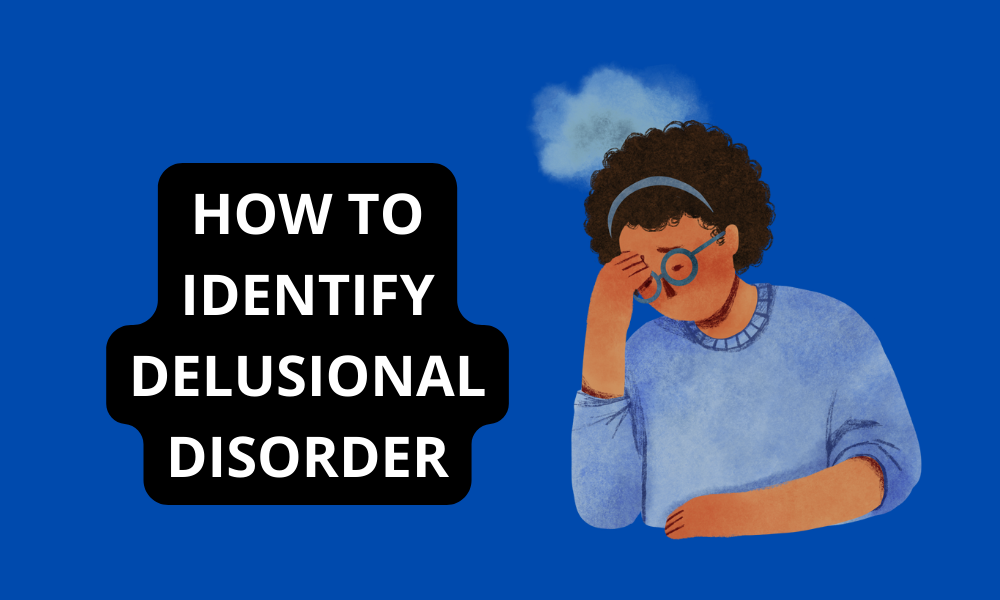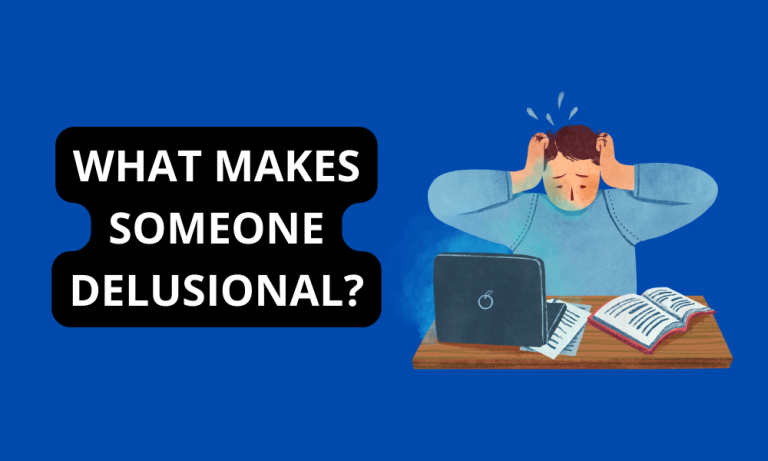How To Identify Delusional Disorder?

Imagine having thoughts that don’t match with what’s really happening around you. This is what happens to some people with Delusional Disorder. It’s like their mind plays tricks on them, making them believe things that aren’t true. Even when there’s clear proof that they’re wrong, they still think they’re right.
In this big guide, we’re going to take a close look at Delusional Disorder. Think of it like a treasure hunt where we’re searching for clues to understand this puzzling condition. We’ll talk about the signs that can help us figure out if someone has it. We’ll also try to uncover why these strange thoughts happen in the first place.
But don’t worry, we’re not just here to share facts. We want to make things easier for you. If you or someone you know is dealing with Delusional Disorder, we’ll give you tips on how to manage it. It’s like having a map to navigate through a tricky maze. By learning more about Delusional Disorder, we hope to bring understanding and support to those who need it. So, let’s start our journey into the world of Delusional Disorder together.
Recognizing the Symptoms of Delusional Disorder
Identifying a disorder can be challenging, as individuals with this condition may genuinely believe in the validity of their delusions, making it difficult to convince them otherwise. However, specific symptoms can indicate the presence of this Disorder. It is important to note that a qualified mental health professional can only make an accurate diagnosis. Here are some common signs and symptoms:
Persistent and Unwavering Belief in Delusions
A primary characteristic of Delusional Disorder is the unwavering conviction in the reality of delusions, despite contradictory evidence. These beliefs persist for an extended period, often lasting months or even years, and are not influenced by logical reasoning or external factors. Individuals with Delusional Disorder genuinely believe in the truthfulness of their delusions, which can significantly impact their perception of the world and their interactions with others.
Lack of Insight or Awareness
People with Delusional Disorder typically lack insight into the irrationality of their beliefs. They cannot recognize that their delusions are not based on reality and may vehemently defend their distorted convictions when challenged. This lack of awareness can make it challenging to engage in rational discussions or provide support for their condition.

Social and Occupational Impairment
Delusional Disorder can cause significant disruptions in an individual’s social and occupational functioning. Persistent delusions can lead to strained relationships, social isolation, and difficulties in maintaining employment. The intensity of the fantasies may consume their thoughts and limit their ability to focus on daily tasks and responsibilities.
Emotional Distress
Living with Delusional Disorder can be emotionally distressing for individuals. Their false beliefs can generate intense fear, paranoia, anxiety, and even anger. These emotions can further exacerbate their isolation and hinder their ability to engage in healthy social interactions.
Absence of Hallucinations
Unlike other psychotic disorders, Delusional Disorder does not typically involve hallucinations. Hallucinations are sensory experiences that seem real but are not based on reality, such as hearing voices or seeing things that are not there. In Delusional Disorder, the focus is primarily on delusions, with hallucinations being absent or minimal.
Understanding the Causes of Delusional Disorder
The exact causes of Delusional Disorder remain unclear, but research suggests a combination of genetic, biological, environmental, and psychological factors may contribute to its development. Here are some potential causes:
Genetic Predisposition
There is evidence to suggest a genetic predisposition to Delusional Disorder. Individuals with a family history of psychotic disorders may be at a higher risk of developing the condition. However, genetic factors alone are insufficient to cause the Disorder and are often influenced by other environmental and psychological factors.
Neurobiological Factors
Abnormalities in brain structure and function may play a role in Delusional Disorder. Neurotransmitter imbalances, particularly involving dopamine, have been implicated in developing psychotic symptoms. Additionally, structural abnormalities in specific brain regions, such as the prefrontal cortex, have been observed in individuals with Delusional Disorder.
Environmental Stressors
Stressful life events, such as trauma, loss, or significant changes, can contribute to the onset or exacerbation of Delusional Disorder. These events may act as triggers that interact with underlying vulnerabilities, leading to the development of delusional beliefs.
Cognitive Factors
Cognitive processes and biases can influence the formation and maintenance of delusions. Individuals with Delusional Disorder may have difficulties accurately interpreting and processing information, leading to misinterpreting events and reinforcing their false beliefs. Cognitive therapy approaches aim to address these cognitive distortions and promote more adaptive thinking patterns.
Researchers are continuously exploring new avenues to understand the complexities of delusions, and one intriguing approach involves investigating the impact of cognitive processes through tools like the male reality calculator to gain deeper insights into the Disorder’s mechanisms.
Coping Strategies for Individuals with Delusional Disorder
Individuals with Delusional Disorder can employ various coping strategies to manage their symptoms and enhance their well-being. Here are some effective coping strategies:
Establish a Supportive Network
Building a support network of understanding friends, family members, or support groups can provide a sense of belonging and reduce feelings of isolation. Sharing experiences, seeking advice, and finding empathetic listeners can be immensely helpful in navigating the challenges associated with Delusional Disorder.
Learn Stress Management Techniques
Stress can exacerbate delusions and contribute to overall distress. Learning and practising stress management techniques can help individuals with Delusional Disorder effectively manage their symptoms. Some helpful strategies include deep breathing exercises, meditation, mindfulness, engaging in hobbies or activities that bring joy, and maintaining a healthy lifestyle with regular exercise and proper nutrition.
Maintain a Consistent Routine
Establishing and maintaining a structured daily routine can provide stability and a sense of control for individuals with Delusional Disorder. Having a predictable schedule can reduce anxiety and help individuals stay grounded. It is important to prioritize self-care, including adequate sleep, regular meals, and engaging in activities that promote relaxation and well-being.
Educate Yourself and your Loved Ones
Learning about Delusional Disorder and sharing that knowledge with loved ones can foster understanding and support. Education can help reduce stigma and misconceptions surrounding the condition, enabling better communication and empathy within relationships. Being informed about the Disorder can also empower individuals to seek appropriate treatment and advocate for their needs.
Monitor and Challenge Delusional Thoughts
Developing self-awareness and recognizing when delusional thoughts are present is crucial. Individuals can learn to challenge the validity of their beliefs by questioning the evidence supporting them and considering alternative explanations. Engaging in reality-testing exercises, such as seeking objective feedback from trusted individuals or consulting mental health professionals, can help individuals gain a more balanced perspective.
Engage in Self-Expression and Creative Outlets
Finding healthy outlets for self-expression, such as art, writing, or music, can provide a means to channel emotions and thoughts associated with Delusional Disorder. Creative activities serve as a form of catharsis, allowing individuals to explore their inner world, express their experiences, and gain a sense of personal fulfilment.

Practice Self-Compassion
Living with Delusional Disorder can be challenging, and individuals may experience frustration, self-blame, or negative self-judgment. Practising self-compassion involves treating oneself with kindness, understanding, and acceptance. Engaging in self-care activities, cultivating positive self-talk, and seeking support when needed can help foster self-compassion and enhance overall well-being.
Conclusion
Delusional Disorder is a complex psychiatric condition characterized by persistent false beliefs that individuals firmly hold despite contradictory evidence. Identifying and understanding the symptoms, causes, and diagnosis of Delusional Disorder is crucial for effective treatment and support.
By seeking professional help, engaging in therapy, and employing coping strategies, individuals with Delusional Disorder can effectively manage their symptoms and enhance their overall well-being. Building a solid support network, learning stress management techniques, and maintaining a consistent routine can contribute to a fulfilling and balanced life.
Remember, if you or someone you know is experiencing symptoms of Delusional Disorder, it is essential to reach out to a qualified mental health professional for a comprehensive evaluation and appropriate treatment. With the proper support and resources, individuals with Delusional Disorder can lead fulfilling lives and navigate their condition with resilience and strength.






